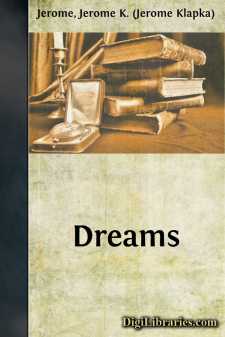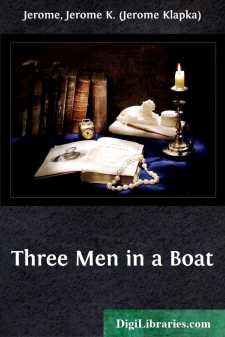Categories
- Antiques & Collectibles 13
- Architecture 36
- Art 48
- Bibles 22
- Biography & Autobiography 813
- Body, Mind & Spirit 142
- Business & Economics 28
- Children's Books 17
- Children's Fiction 14
- Computers 4
- Cooking 94
- Crafts & Hobbies 4
- Drama 346
- Education 46
- Family & Relationships 57
- Fiction 11829
- Games 19
- Gardening 17
- Health & Fitness 34
- History 1377
- House & Home 1
- Humor 147
- Juvenile Fiction 1873
- Juvenile Nonfiction 202
- Language Arts & Disciplines 88
- Law 16
- Literary Collections 686
- Literary Criticism 179
- Mathematics 13
- Medical 41
- Music 40
- Nature 179
- Non-Classifiable 1768
- Performing Arts 7
- Periodicals 1453
- Philosophy 64
- Photography 2
- Poetry 896
- Political Science 203
- Psychology 42
- Reference 154
- Religion 513
- Science 126
- Self-Help 84
- Social Science 81
- Sports & Recreation 34
- Study Aids 3
- Technology & Engineering 59
- Transportation 23
- Travel 463
- True Crime 29
Jerome K. (Jerome Klapka) Jerome
Jerome Klapka Jerome was an English writer and humorist best known for his comic travelogue "Three Men in a Boat," published in 1889. His works often feature light-hearted and witty observations on everyday life and human nature, which made him popular during the late Victorian and Edwardian eras. Jerome also wrote plays, essays, and other novels, contributing significantly to English humor literature.
Author's Books:
Sort by:
The neighbourhood of Bloomsbury Square towards four o'clock of a November afternoon is not so crowded as to secure to the stranger, of appearance anything out of the common, immunity from observation. Tibb's boy, screaming at the top of his voice that she was his honey, stopped suddenly, stepped backwards on to the toes of a voluble young lady wheeling a perambulator, and remained deaf,...
more...
CLOCKS. There are two kinds of clocks. There is the clock that is always wrong, and that knows it is wrong, and glories in it; and there is the clock that is always right—except when you rely upon it, and then it is more wrong than you would think a clock could be in a civilized country. I remember a clock of this latter type, that we had in the house when I was a boy, routing us all up at three...
more...
ON THE ART OF MAKING UP ONE'S MIND "Now, which would you advise, dear? You see, with the red I shan't be able to wear my magenta hat." "Well then, why not have the grey?" "Yes—yes, I think the grey will be MORE useful." "It's a good material." "Yes, and it's a PRETTY grey. You know what I mean, dear; not a COMMON grey. Of course grey is always...
more...
The most extraordinary dream I ever had was one in which I fancied that, as I was going into a theater, the cloak-room attendant stopped me in the lobby and insisted on my leaving my legs behind me. I was not surprised; indeed, my acquaintanceship with theater harpies would prevent my feeling any surprise at such a demand, even in my waking moments; but I was, I must honestly confess, considerably...
more...
CHAPTER I She had not meant to stay for the service. The door had stood invitingly open, and a glimpse of the interior had suggested to her the idea that it would make good copy. “Old London Churches: Their Social and Historical Associations.” It would be easy to collect anecdotes of the famous people who had attended them. She might fix up a series for one of the religious papers. It...
more...
CHAPTER I I had a vexing dream one night, not long ago: it was about a fortnight after Christmas. I dreamt I flew out of the window in my nightshirt. I went up and up. I was glad that I was going up. “They have been noticing me,” I thought to myself. “If anything, I have been a bit too good. A little less virtue and I might have lived longer. But one cannot have everything.” The...
more...
They look so dull and dowdy in the spring weather, when the snow drops and the crocuses are putting on their dainty frocks of white and mauve and yellow, and the baby-buds from every branch are peeping with bright eyes out on the world, and stretching forth soft little leaves toward the coming gladness of their lives. They stand apart, so cold and hard amid the stirring hope and joy that are throbbing...
more...
MALVINA OF BRITTANY. THE PREFACE. The Doctor never did believe this story, but claims for it that, to a great extent, it has altered his whole outlook on life. "Of course, what actually happened—what took place under my own nose," continued the Doctor, "I do not dispute. And then there is the case of Mrs. Marigold. That was unfortunate, I admit, and still is, especially for Marigold. But,...
more...
CHAPTER I. Three invalids.—Sufferings of George and Harris.—A victim to one hundred and seven fatal maladies.—Useful prescriptions.—Cure for liver complaint in children.—We agree that we are overworked, and need rest.—A week on the rolling deep?—George suggests the River.—Montmorency lodges an objection.—Original motion carried by majority of three to one. There were four of...
more...
THE SOUL OF NICHOLAS SNYDERS,OR THE MISER OF ZANDAM Once upon a time in Zandam, which is by the Zuider Zee, there lived a wicked man named Nicholas Snyders. He was mean and hard and cruel, and loved but one thing in the world, and that was gold. And even that not for its own sake. He loved the power gold gave him—the power to tyrannize and to oppress, the power to cause suffering at his will. They...
more...











